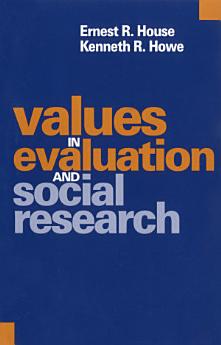Values in Evaluation and Social Research
About this ebook
--Gary T. Henry, Georgia State University
"This book, as the title promises, unfurls the concept of value in the practice of program evaluation. The editors go well beyond recognizing that all data gathering and description are value laden and that all evaluators have value commitments shaping their designs. They examine the ethical and political burdens accompanying any evaluation contract. Out of an extended collaboration, Kenneth R. Howe and Ernest R. House together redirect their advocacy toward the pursuit of democracy."
--Robert E. Stake, University of Illinois, Urbana-Champaign
The authors use the tools of philosophy and the insights from evaluation practice to cut through current confusion about values and the interplay of facts and values. Four views of facts and values in evaluation are analyzed: those rooted in a fact-value dichotomy and those of radical constructivists, postmodernists, and deliberative democrats. The arguments are tough, the prose concise, and the insights compelling.







